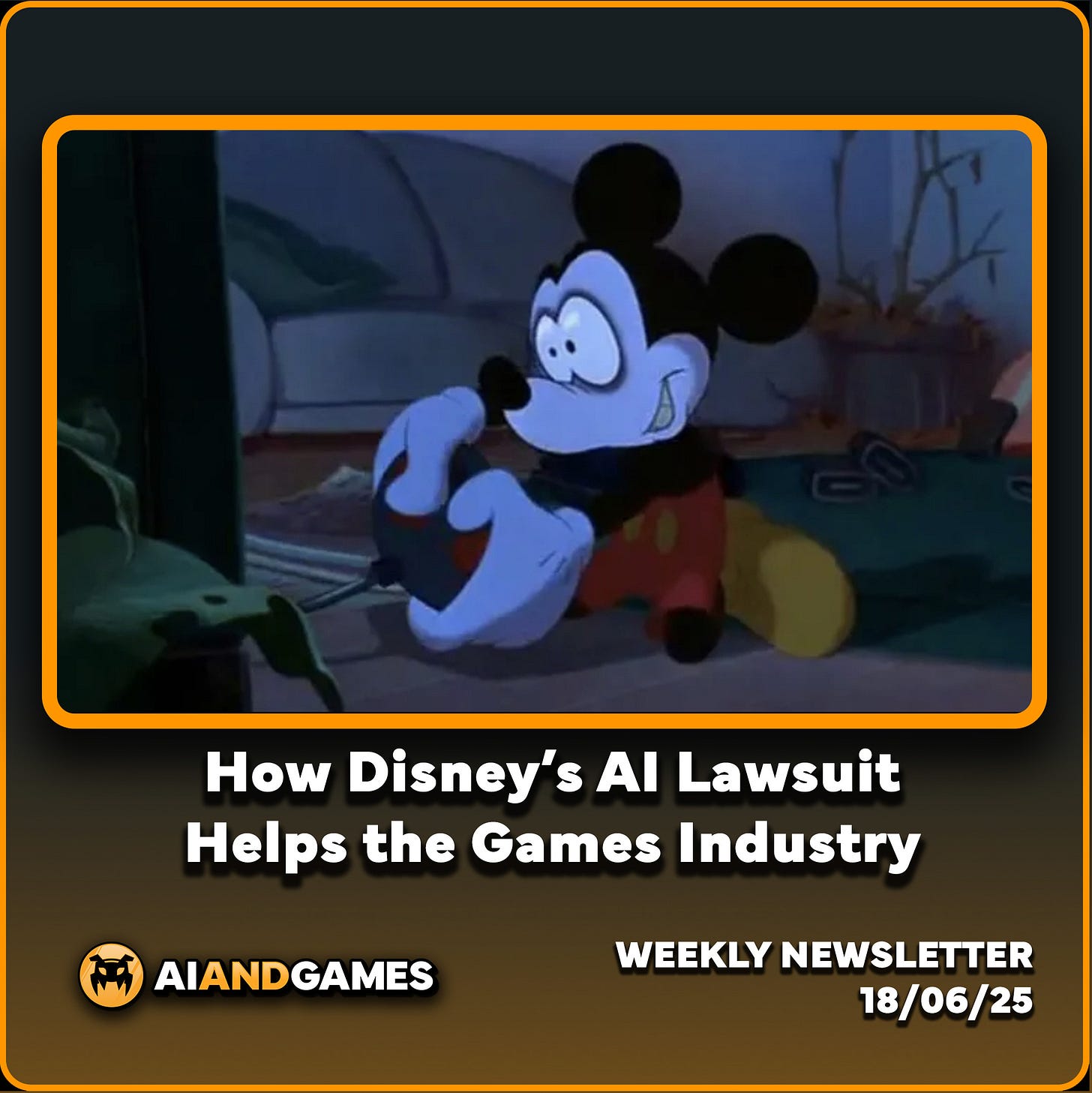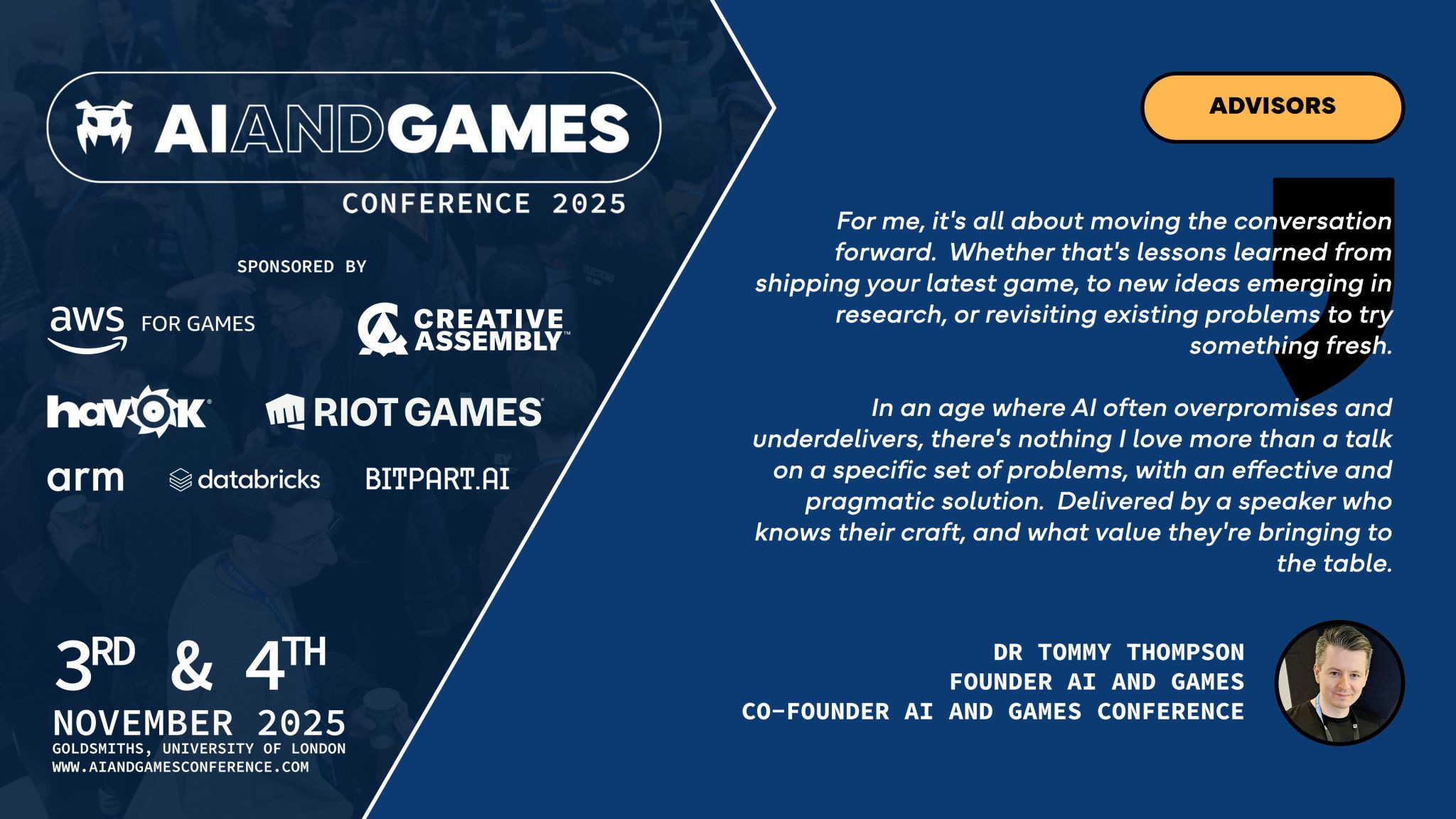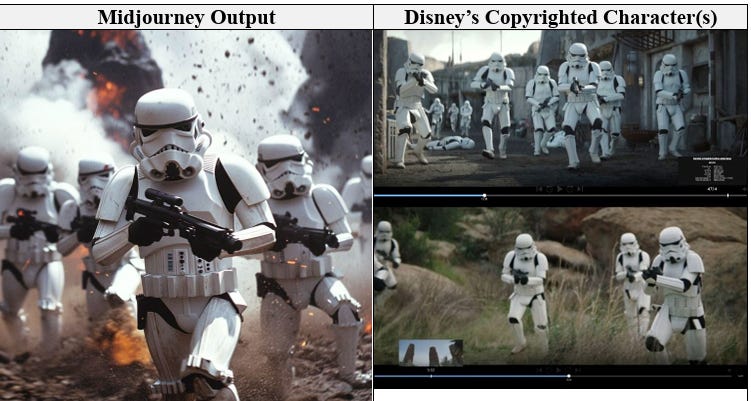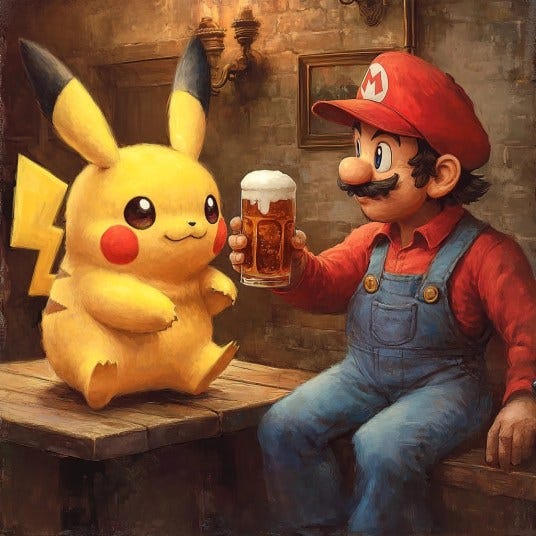How Disney's AI Lawsuit Helps the Games Industry | 18/06/25
When you zoom out, there's a pattern ermerging.
The AI and Games Newsletter brings concise and informative discussion on artificial intelligence for video games each and every week. Plus summarising all of our content released across various channels, like our YouTube videos and in-person events like the AI and Games Conference.
You can subscribe to and support AI and Games on Substack, with weekly editions appearing in your inbox. The newsletter is also shared with our audience on LinkedIn. If you’d like to sponsor this newsletter, please visit our sponsorship enquiries page.
I’m Tommy Thompson, this is the AI and Games newsletter, and this week we’re revisiting the topic that has come to dominate my writing career on the internet: AI lawsuits! With the recent news of Disney and Universal joining forces to sue Midjourney, I thought let’s take a slightly different spin on this and make a point about what all of this means for the games industry (my beloved).
As more and more legal action kicks off, a pattern is beginning to take shape, and more critically it is aiming to support all creative industries. Plus at a time when games is ill-equipped to defend itself, how the other corners of entertainment are standing working to support the sector.
But before all of that we have more news, announcements, and some rambling.
Let’s go!
Oh, if you’re curious about the headline graphic. This is a still from ‘Runaway Brain’, a Disney horror short published in 1995 that starts with Mickey being somewhat obsessed over a fighting game that’s a satirical take on Snow White. The more you know!
Follow AI and Games on: BlueSky | YouTube | LinkedIn | TikTok
Announcements
As always, let us kick things off with a couple of announcements.
AI and Games Conference 2025
A quick shout-out for our all important AI and Games Conference, coming to you this November. Early-bird tickets are on sale, but a reminder that our call for submissions is open until the end of July.
This year we (read: Shraddha) is running a little marketing campaign where each of the advisory board given an insight into what they like to see in a talk submission, and this week I’m taking the lead!
We’ve already had submissions come in, and some there’s some exciting stuff in there. If you’re working in and around AI in the games industry, or are a researcher in the space, be sure to start polishing up those submissions. Head over to the submission link for more info on what to expect.
Next Week: Summer School in Malmo!
I’m smashing through a bunch of work this week, including stuff for clients, some secret scheming, and hopefully the final draft of the Alien: Isolation Retrospective before I fly out to Malmo, Sweden for the AI and Games Summer School.
As discussed before, this is an event coordinated by a group of academic colleagues, and one that I’ve been involved with in the past. I’ll be there from lunchtime from the 23rd through to the 25th and then got to bounce back to the UK, but it runs right up until close of Friday with the game jam running across the last two days. I’ll run a post-mortem on the event after I get back.
There are still some tickets on sale now. Plus if you’re based around the Malmo/Copenhagen area and are free on the Tuesday night, be sure to join us for our meetup running at Malmo Brewing co. & Taproom from 6pm on Tuesday 24th. While this is simply a meetup/gathering, we ask if people can register at the link just so we have an idea for numbers and not to upset the venue. Hope to see some of you there!
AI (and Games) in the News
Well, this weeks issue is all about the big news story of Disney and Universal suing Midjourney, but in between we have some other smaller stories to recount:
UK Environmental Agency Can’t Predict Water Shortages Due to AI
As reported The Guardian, the UK’s environment agency is concerned about how it can successfully predict and prevent water shortages in England as a result of data centres - many of which increasing in scale due to AI. It’s predicted that England’s public water supply could fall short by as much as 5 billion litres a day by 2055 unless efforts are taken to prevent issues and future proof current infrastructure. But despite data centres using a lot of water to keep their machines running cool, they don’t have to report their water consumption to regulators. A real concern give it is anticipated that data servers will increase significantly in the UK and elsewhere as a result of AI compute.Microsoft Announces Partnership Between Xbox and AMD for Future Hardware
Yesterday Xbox came forward to announce that they’ve entered a multi-year partnership with AMD to power their upcoming hardware. This is aimed at providing new chipsets for future Xbox consoles, be they in your lounge or handhelds such as the upcoming ROG Xbox Ally (X) - which are already power by AMD Ryzen chipsets. This new generation of AMD chips, much like Nvidia’s, allows for AI compute to be ran on the chip. Allowing for everything from neural rendering (e.g. image upscaling) to even dedicated use of AI cores for gameplay. The announcement also indicates these chipsets will be used for the cloud-based Xbox delivery (which makes sense if you want to assume parity across the board).Bungie Delays Marathon to Fix a Bunch of Stuff, Including the AI
Halo and Destiny creators Bungie have been having a bit of a hard time with their upcoming project Marathon: an extraction shooter that harks back to an IP that pre-dates their transition to x86 architectures! The narrative surrounding the announcement, and later their alpha playtest, has been rather cool, and it was running risk of another live-service disaster for Sony. Perhaps not quite on par with Concord, but would certainly reinforce the idea that their batting average is a little shoddy.
They have now taken to the Bungie website to announce the game is delayed and will no longer release on September 23rd (no new release date at this time). But one of the areas of feedback they’re working on was to create “more challenging and engaging AI encounters”. I didn’t try the demo myself, but I had heard that the NPC AI was rather bland.
What AI Litigation Means for the Games Industry
Okay, let’s dig into the big story of the week, or rather how the latest stories fit into a broader narrative. Last week the story that broke the internet mere hours after our last issue - this always happens doesn’t it? - was that Disney (including its subsidiaries such as Marvel Characters Inc, LucasFilm and 20th Century Studios) and Universal Studios (including their subsidiary Dreamworks) have filed a lawsuit against AI image generator Midjourney for “direct and secondary copyright infringement under the Copyright Act”. The suit pulls no punches, and is perhaps one of the most… ‘aggressive’ lawsuits I’ve seen thus far as I started going down this rabbit hole over the past year.
But while we’ll get into the meat of the lawsuit itself, it’s not the focus of this issue. Rather, I wanted to highlight that when you zoom out, you’re starting to see a pattern in the litigation. A pattern that is not just attacking generative AI companies from multiple angles, but also one that will in the long run service the games industry quite well. Given it seems clear at this time it’s incapable (or often unwilling) to defend itself right now.
The Disney/Universal Lawsuit in Brief
I could easily spend this issue just talking about the full 143 page lawsuit - which Variety have hosted online for people to read - given it is a really interesting read. In short, the argument laid out by Disney and Universal is that Midjourney has, since it’s inception, stolen copyrighted assets it does not have ownership of and from that it has trained its own image generator to create a “virtual vending machine, generating endless unauthorized copies of Disney’s and Universal’s copyrighted works”.
The suit really pulls no punches in highlighting, as early as page 1 of the suit, that Midjourney has gained monetarily ($300 million in revenue in 2024) from the exploitation of the works of others without providing appropriate compensation. Describing their behaviour as “calculated and wilful”, and that they have failed to respond to requests from both companies to remove the copyrighted works.
A Lawsuit Years in the Making
What makes this all the more interesting is that, much like the Ziff Davis lawsuit against OpenAI, both Disney and Universal have sat and they have waited. Amassing some pretty damning evidence. Highlighting not just that Midjourney’s models are capable of egregious violations of copyright, but equally that they do so without fear of reprisal, describing their operations as “systematic and ongoing”.
This is one of the reasons Disney and Universal are attacking Midjourney specifically. Given they have made zero effort to mitigate the ability to generate copyright infringing materials. While I highlighted a few weeks back how (depressingly) easy it is to ‘Ghibli-fy’ your images on GPT given it’s not protected under Japanese copyright law, you’ll notice if you try to infringe on Disney’s IP on OpenAI’s models, they will block you from doing so.

While I am highly confident that OpenAI have no doubt used the materials from these studios to help them in training their content, you’ll notice it’s hard to try and get any of OpenAI’s text or image generation models to violate very high-profile and well-known copyrighted assets. They’re at least taking some action to mitigate this possibility. Meanwhile, one of the members of the AI and Games Discord server generated the image below on Midjourney with zero hassle the day the lawsuit was announced.
So the lawsuit focusses on a number of key things:
The large-scale scraping and theft of copyrighted materials for their AI training.
An act that Midjourney Founder and CEO David Holz outright admitted to in an interview with Forbes back in 2022 - I bet he’s regretting that one right about now, they quote it in the lawsuit.
The monetisation of the end-product, Midjourney itself, and how users can subscribe for up $1100 a year to generate art derived from these stolen assets with little effort - often using descriptions of copyrighted works as means to prompt the model.
Midjourney isn’t just trained to use this content, but given it can generate it as shown below, it clearly was trained to be able to generate infringing content puroposefully.
Midjourney repeatedly displays and distributes derivative works of copyrighted materials - often in their own promotional materials to draw new customers.
Despite requests from both companies, Midjourney has not taken any reasonable measures to prevent further infringement, despite having content moderation tools in place for other issues (e.g. sexual violence).
Ultimately, that Midjourney and it’s ilk are running risk of destabilising the backbone of commercial entertainment through flagrant violations of copyright and treademarks laws designed to protect these assets for exploitation.
The example you see above is just one of dozens of cases where Disney and Universal pull up properties such as Shrek, Marvel, The Simpsons, Minions, Frozen, and many more, and how readily they can generate AI-crafted results. All of this reinforces the point that Midjourney not only stole their materials, but equally that you can easily create them.
All in all, I’m very interested in seeing where this one winds up.
A Pattern is Forming
While I’m seldom in the corner of rooting for giant corporations taking ‘smaller’ businesses to court, I can certainly see the appeal of what’s going down with Disney right now. But also, it’s worth highlighting that there’s a pattern that’s beginning to take shape. One that is both attacking the violations of the law from various angles, while also shaping up to try and defend the creative industries, and ultimately this is going to help the games industry at a time it is incapable of defending itself.
A Collection of Litigation
Let’s take a quick moment to list just a handful of the most high-profile legal cases happening right now that relate to the (alleged) illegal practice by AI companies.
LLM creator Anthropic are currently being sued by Reddit for scraping users data without permission (more than 100,000 times).
Anthropic have also been sued by the likes of Universal Music Group for stealing lyrics from songs.
Stability AI and Midjourney were sued by artists for scraping work without permission on DeviantArt, and for then creating derivative works of artists that present their work on the site. This initial case was dismissed, but subsequent suits against them have gained traction.
As mentioned last week, Stability is now being sued in the UK by Getty Images.
OpenAI are being sued by 101 different companies as well as individuals such as authors. But the most high-profile case is no doubt The New York Times in 2023 which also bundles in Microsoft given they backers of OpenAI - and their copilot tools rely on GPT and similar models.
As discussed earlier this year, OpenAI are also being sued by media conglomerate Ziff Davis which owns gaming websites such as IGN and Eurogamer.
Meta (y’know, Facebook, Quest VR) are being sued by a number of authors for stealing their books to train their Llama models. This is largely tied to the use of pirated book libraries such as Bibliotek and Z-Library.
A Change of Approach
Now virtually all of these lawsuits have two common threads:
Generative AI company scraped publicly accessible information to train their generative models.
This was done without permission of any rights holders, and without compensation.
Generative AI company now permits the ability to generate derivative assets akin to those original works - again without permission or compensation.
In some cases the derivative works are tangentially or thematically related. In other cases, like Midjourney, they are tantamount to plagiarism.
But the thing I have noticed recently, is that now that there are a lot of these lawsuits cropping up, the language is changing slightly. Again, I’m no lawyer, but it strikes me that the legal teams in each of the more recent lawsuits - notably Ziff Davis and Disney/Universal - are reading up and checking the progress on the existing suits, and are changing the approach.
Previously the emphasis was simply on ‘this is wrong, this breaks copyright law’, but now I’ve noticed in more recent suits they’re trying a different tactic. The Ziff Davis suit didn’t just focus on the fact that material was taken without consent, but also that the company had tried to come to an agreement with OpenAI, only to be rebuffed - implying that not only was the defendant aware of the issues of the plaintiff, but they ignored it given they felt they were beyond reproach.
Plus, as I discussed they paid a lot of attention to how GPT regurgitates information from Ziff Davis websites: highlighting both a lack of quality and consistency, and often reporting incorrect information both from their pages, but also from its trained output. Ziff Davis is arguing just as much about brand reputation as it is about the fact that OpenAI appropriated their materials without consent. Their point being that not only did OpenAI steal their works - and ignore their requests to stop doing so - their technologies fail to even reproduce the works accurately, and that’s a reputational risk for the organisation.
Meanwhile, this more recent Disney/Universal suit is focussed heavily on not just that the companies involved are committing a form of fraud by stealing intellectual property, but also that they do so without investing in the companies that build said IP (Ziff Davis also made this point, but it’s not as explicit a focus). To do so runs risk of breaking down the entertainment industry in the US (and the world over), if companies cannot pursue violations of their work, regardless of whether it is made by a human or a computer. The Disney suit says the quiet thing out loud, which I will now express in my own words:
If you continue to permit this, it destabilises the media and entertainment industries in the United States - the largest of its kind in the world - that produces over $650 billion in revenue annually. Industries like this, that rely on copyright protections, account for over $3 trillion dollars of value to the US economy, with news and entertainment accounting for around 10% of US GDP. It is in the best interests of the US government to protect it.
Again, I’m seldom in the corner of big corporations trying to hog copyright - I mean good grief have you ever dug into how aggressively Disney tries to hold onto its assets? But it highlights that, regardless of the US administration’s opinion of the media and entertainment sectors, it is not in their best interests economically to bring it into disarray. A big part of the United State’s cultural exports are from the entertainment sector, and Disney and Universal are a huge aspect of this. This year alone we’ve seen Disney push out Snow White, Lilo & Stitch, Pixar’s Elio, MCU titles such as Captain America: Brave New World, The Thunderbolts* and Fantastic Four: First Steps plus TV shows like Daredevil: Born Again and Andor. Regardless of their quality, they often have a big impact on the conversation around contemporary pop culture. And right now generative AI is affecting the livelihood of not just the US’ economic viability, but its capacity to also generate influence around the world through media - a soft power that I often suspect the powers that be seldom really think about.
An Industry Incapable of Defending Itself
It’s worth reminding readers that the games industry in its current condition is not really in a position to defend itself against so many of the issues cropping up as a result of generative AI’s (rather aggressive) expansion. At this time no major games company have began litigation against a generative AI company, and that’s largely given the tangled web of AI tooling emerging from the same conglomerates that make your favourite games.
The video games industry is in a bit of a pickle with generative AI, because so many of the studios in the big budget AAA space, plus of course platforms such as Xbox, PlayStation, the Google Play store and Meta Quest 3, are all tied up with companies who are invested in building generative AI as an industry. This in turn has a knock on effort on the likes of trade representatives like UKIE in this country, or the ESA in the United States, saying nothing of substance on this subject now for years. Last weeks publication by the BFI in the UK is the first real insight into the impact of generative AI into the screen industries in this country - and we’ll come back to that soon in a new digest issue.
This means that much of the ‘resistance’, or at least meaningful conversation on the matter, is happening at lower levels: indie developers who want nothing to do with generative AI due to the moral, ethical, and legal issues it presents. As cool as it is for me to be invited to speak at events around the world on the state of AI in the games industry - something I take very seriously and I’m proud to be able to do - it’s a sorry state of affairs that one guy working out of his spare room is more of an authority on the subject in the eyes of the media and broader games sector than the people building the technology, who also work in this sector!
Anyway, please help support our work, this is a lot of effort, but I digress…
With no games companies stepping up to the plate to deal with these issues, it’s interesting that so many of the elements that games studios are worried about when it comes to their work being exploited by generative AI is being tackled by these lawsuits.
The misappropriation of materials related to intellectual property.
The exploitation of those materials to create derivative works through generative models.
The safety of consumers in an era of AI-generated falsehoods and questionable content.
Protecting the integrity and value of a studios intellectual property.
Ensuring reproduction (even if permitted) is accurate and representative.
The ability to enforce ownership and protect IP violations in the future, notably in the US, UK, and Europe.
These are the things that games studios need to be worrying about, so that they can continue to protect their intellectual property. I’ve argued about this already with the issues happening in the UK scene, but we’re moving towards a scenario where even announcing a game publicly will leave studios in the lurch, given your PR team can’t even put out promotional art in the UK without it being scraped for AI training and you having no legal recourse. Derivative works of your game could be online while you’re still knee deep in development, all because you had the audacity to announce what you were working on.

Naturally, there is still plenty to come on this topic, but I feel like the games industry is going to be saved by everyone but the games industry. The continued silence on this issue is staggering. Perhaps all the more damning when you remember we are, as an industry, often at the forefront of emerging technologies. Heck, many of the big innovations in AI have came about by using games as a platform. Right now the best we get are generic platitudes without any meaningful discourse. I have come to resent reading the 800th media post about a studio head or C-suite exec’s milqutoast discussion of the conversation.
AI for games is not a black and white issue, but the public conversation continues to treat it as one - either sunny uplands brought by generative AI, or a toxic cesspit of plagiarism and lawlessness. But unlike the last time we had this with Web3, AI in games is many shades of grey, and while it wouldn’t be the first time the industry has collectively stayed silent on pertinent issues, it only reinforces outdated perceptions of games being a ‘smaller’ or ‘lesser’ form of the broader media and entertainment landscape when everyone else is out there fighting for their rights to be upheld against generative AI, while games has little of substance to say.
There is a world in which generative AI is a useful tool in game development, that helps developers in their craft without exploitation, and without legal quandaries. And it’s a collective responsibility to head towards that end result.
Wrapping Up
Another week, another round of AI litigation. Oh boy, I should really rename this newsletter to ‘AI and the Law and Games’ huh?
Anyways, next week I’ll be over in Malmo for the summer school, so I’ll be keeping it a little lighter with the sponsor update for our paying subscribers - plus all the regular stuff.
Thanks once again for reading, and I’ll catch you all next week!
















Really enjoyed reading this, you have a lot of knowledge on the subject!
I agree, I do not normally support big corporations taking down little ones! However, this case is arguably for the good of all.